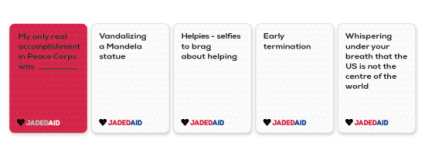JadedAid, a new party game derived in style and spirit from Cards Against Humanity, satirizes the international development industry in brutal and hilarious fashion.
Cards Against Humanitarians
by Iyla Lozofsky
Foreign Policy
September 28, 2015
Needless to say, this very serious industry has its very serious critics. But few are as creative (or as hilarious) as three young development professionals who, in the last few weeks, have chosen to express their discontent by self-publishing a satirical card game. JadedAid is modeled on the popular millennial game, Cards Against Humanity, in which players compete to select the funniest (or most vulgar) answers to a set of “fill-in-the-blank” questions. Just a week since its opening, the JadedAid KickStarter campaign has collected nearly twenty thousand dollars “” far ahead of its creators”™ targets “” and the game is well on its way to completion. As an example of the kind of decidedly un-pc satire the game provides, here is one possible combination of cards:

Some of the card ideas were developed by the game”™s inventors, who, all in their thirties, have extensive experience in the technology and communication side of the development industry. But the vast majority of the suggestions (nearly 800 at last count) were submitted by friends, colleagues, and anonymous development workers. One of the game”™s co-founders, Jessica Heinzelman, 36, attributes the game”™s immediate appeal to the need for development workers to “let off some steam” by subjecting their experiences in the field to mockery.
Judging by the submissions, that experience can be fraught with generational, financial, and above all, racial angst. Heinzelman calculated that the word that has appeared in the submissions most often was “white.” (One of the possible fill-in-the-blanks is “Foreign assistance was started to feed white people”™s unquenchable thirst for ______.” Possible answers include “the perfect handicapped brown person,” “a sinking boat full of brown people,” and other sarcastic takes on racialized development tropes.) Outside of a room of semi-inebriated development workers, these answers would elicit uncomfortable grimaces “” but getting them out there is part of the point. “If we can galvanize people to not be so uncomfortable about saying the things they”™ve always wanted to say, maybe we can have much more nuanced, more honest panel discussions on development issues that I get to attend as the token African,” says co-founder Teddy Ruge, 39, a Ugandan writer, technology entrepreneur, and development critic.
For Ruge, the submissions point out not only an uncomfortable racial dynamic, but a deep divide between how development is perceived by the “developed” and “developing” worlds. “I have an entire village of people that have been resilient,” he says, “but now there”™s a white van over there coming and teaching us about resilience. If it wasn”™t for resilience, we wouldn”™t have survived for a thousand years waiting for your SUV to come and rescue us.” Ruge wants the development agenda to be driven by developing countries themselves, not by well-meaning outsiders. Similarly, he suggests that the U.N.”™s Sustainable Development Goals might look considerably different if the concept of development were not “defined by western organizations.” (As Ruge expounds on this topic, his co-founders joke that their game needs a new card: “An educated angry African man yelling at me.”) Read more.
